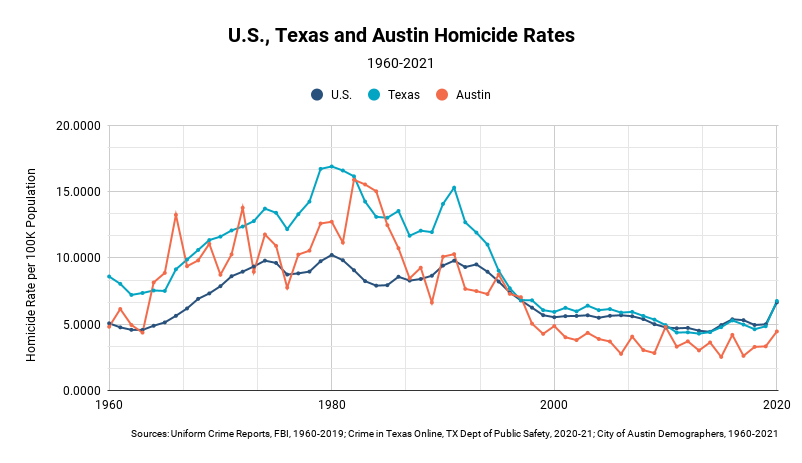More police officers will not help counter rising homicide rates, UT study finds
October 6, 2021
Editor’s Note: This article first appeared as part of the September 27 flipbook.
No correlation exists between the number of sworn police officers and homicide rates in Austin or nationally, according to a study by a UT researcher.
Researcher Bill Spelman said that while homicide rates did increase in Austin this year, that trend was reflected in other major cities as businesses reopened after COVID-19 closures. Business reopenings along with societal unrest are likely the cause for the increase in homicides, Spelman said.
“Homicides take place mostly in living rooms, not in the street, so having a bunch of police officers patrolling and responding quickly to calls won’t help if somebody’s been shot in your kitchen,” said Spelman, a criminal justice expert in the Lyndon B. Johnson School of Public Affairs. “There’s no statistically significant correlation between the numbers for officers and the murder rate. And this is with data going back to the 1960s.”
As of Sept. 12, Austin Police Department has recorded 60 homicides this year, the highest it’s been in 61 years, and it is only nine months into 2021.
“There’s some evidence that yes, it’s about anxiety among the public, and that anxiety was cranked up not just by COVID, but also by Black Lives Matter movement and also by the (presidential) election.”
Austin averaged about 34 homicides per year between 2010 and 2019, according to police reports. In 2020 when the pandemic began, Austin recorded 48 homicides by the end of the year. At the beginning of the year, homicides flatlined overall as people mostly stayed at home, but a combination of the pandemic, the election and high profile social injustices caused rates to increase as people began to come out of lockdown, Spelman said.
Spelman’s study also found that while Austin’s homicide rates set records this year, the murder rates since 1998 are consistently lower than the Texas and U.S. averages. The overall rate of violent crime that police usually respond to has also decreased in 2021, Spelman said.
The increased police controversy goes up for vote.
Advocates for Proposition A, a measure that would increase police staffing if passed in November, say officer shortages have contributed to the increase in homicides.
The proposition would ensure at least two sworn police officers per 1,000 residents in Austin.
The city estimates the item would add $54 to $120 million to the police budget each year for the next five years. In August 2020, Austin City Council voted to reduce APD’s 2020-21 budget by about a third, but in the upcoming fiscal year, APD’s budget will reach a record high at $434 million.
If the additional funding is approved by voters, the city will have to relocate the money from other departments. The city council has not stated which parts of the general fund would be cut to accommodate the measure, but Spelman said cuts will likely begin in areas like libraries and parks.
“But if it goes on for a five-year period with it costing between $50 and $120 million a year, sooner or later, those cuts are going to get to (emergency medical service), fire, mental health services, and all sorts of other things,” Spelman said. However, supporters of Proposition A say the measure will not have a significant impact on other city departments.
“We didn’t have to cut city parks and public libraries two years ago when we had the number of police officers we want now,” said Matt Mackowiak, co-founder of Save Austin Now, the group that proposed the measure.
Noah Krivi, vice president of Horns for Safety, said Proposition A does not consider alternative public safety measures beyond police.
“While I think ideally, (increasing police staffing) would be great, I don’t think the money exists,” Krivi said. “The money is better spent toward prevention — libraries and your mental health departments. … We’re going to have prevention of (crime) in the future rather than spending money on Austin officers now.”
Chas Moore, founder of the Austin Justice Coalition and member of the opposition group No Way on Prop A, said the city should focus on getting to the root of why crimes are happening.
“Is it because these people are experiencing some kind of mental health crisis? Is it because they are experiencing some kind of trauma? Is it because they need a job?”Moore said.



